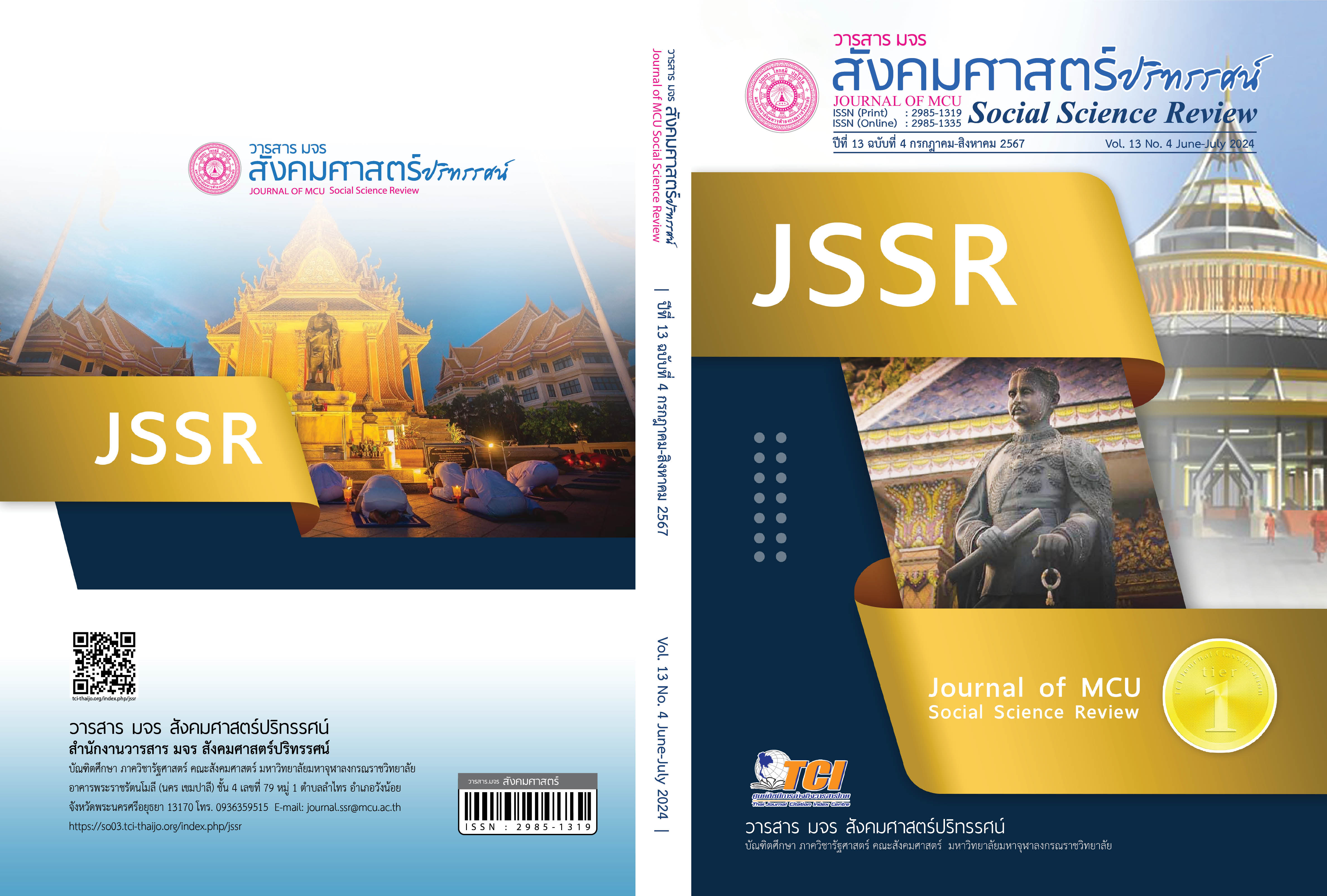การพัฒนารูปแบบสมรรถนะผู้บริหารโรงเรียนคุณภาพวิทยาศาสตร์ คณิตศาสตร์และเทคโนโลยี ระดับมัธยมศึกษา สังกัดสำนักงานคณะกรรมการการศึกษาขั้นพื้นฐาน
คำสำคัญ:
สมรรถนะ, รูปแบบสมรรถนะของผู้บริหารโรงเรียน, โรงเรียนคุณภาพวิทยาศาสตร์ คณิตศาสตร์และเทคโนโลยีบทคัดย่อ
บทความวิจัยนี้มีวัตถุประสงค์ 1. พัฒนารูปแบบสมรรถนะผู้บริหารโรงเรียนคุณภาพวิทยาศาสตร์ คณิตศาสตร์และเทคโนโลยี 2. ประเมินรูปแบบพร้อมทั้งเสนอแนวทางการนำรูปแบบไปใช้ เก็บข้อมูลด้วยการสัมภาษณ์เชิงลึกจากผู้ทรงคุณวุฒิแบบเฉพาะเจาะจง จำนวน 2 รอบ โดยรอบที่ 1 ใช้แบบสัมภาษณ์กึ่งโครงสร้าง มีผู้ทรงคุณวุฒิ จำนวน 7 คน และรอบที่ 2 ใช้แบบสอบถามชนิดเลือกตอบ มีผู้ทรงคุณวุฒิ จำนวน 20 คน รวบรวมความคิดเห็นจากผู้ทรงคุณวุฒิ โดยใช้เทคนิคเดลฟาย จำนวน 20 คน ประเมินความเหมาะสมและความเป็นไปได้ รวมทั้งเสนอแนวทางการนำรูปแบบไปใช้ โดยใช้เทคนิคการสนทนากลุ่ม จากผู้เชี่ยวชาญแบบเฉพาะเจาะจง จำนวน 9 คน วิเคราะห์ข้อมูลโดยการหาค่าร้อยละ ค่ามัธยฐาน ค่าพิสัยควอไทล์ ค่าเฉลี่ยและส่วนเบี่ยงเบนมาตรฐาน
ผลการวิจัยพบว่า 1. รูปแบบสมรรถนะประกอบด้วย 6 องค์ประกอบหลัก 22 องค์ประกอบย่อย 118 ตัวบ่งชี้ ได้แก่ การเป็นผู้นำองค์กรที่มุ่งเน้นผลสัมฤทธิ์, การมีภาวะผู้นำทางวิชาการ, การบริหารเชิงกลยุทธ์, การใช้เทคโนโลยีดิจิทัลและการสื่อสาร, การพัฒนาครูและการพัฒนาผู้เรียน 2. ผลการประเมินรูปแบบมีความเหมาะสมและมีความเป็นไปได้ โดยรวมอยู่ในระดับมาก มีแนวทางการนำรูปแบบไปใช้เพื่อพัฒนาสมรรถนะผู้บริหารใน 2 แนวทาง คือ ผู้บริหารโรงเรียนคุณภาพวิทยาศาสตร์ คณิตศาสตร์และเทคโนโลยีโดยทั่วไป จะพัฒนาสมรรถนะโดยใช้ 118 ตัวบ่งชี้ และผู้บริหารโรงเรียนวิทยาศาสตร์จุฬาภรณราชวิทยาลัย จะพัฒนาสมรรถนะโดยใช้ 66 ตัวบ่งชี้
เอกสารอ้างอิง
Aiamsiri, Y. (2019). The participatory administrative model for gifted students’ scientifically psychological characteristics development at Princess Chulabhorn College, Loei. Journal of Educational Administration and Leadership, 8(32), 242–252.
Amoli, S. J. & Aghashahi, F. (2016). An investigation on strategic management success factors in an educational complex. ScienceDirect, 9(3), 447–454.
Azar, A. S. & Adnan, E. J. (2020). The impact of effective educational leadership on school students’ performance in Malaysia. Education Quarterly Reviews, 3(2), 146–155.
Bloom, B. S. (1968). Learning for mastery evaluation comment, centre for the study of instruction program. Los Angeles: University of California at Los Angeles.
Boonananwong, Ch. et al. (2017). The Analysis of the Components of Strategic Management Model in Secondary Under the Office of the Basic Education Commission, Bangkok Metropolis. Dusit Thani College Journal, 11(2), 318-333.
Bunmee, U. (2018). Morality and ethics for administrators in accordance with organization governance. Veridian E-Journal, Silpakorn University, 11(3), 1399-1408.
Choomwong, N. (2020). Model of the strategic management for private schools under Office of the Private Education Commission in Nonthaburi Province. Journal of Humanities and Social Sciences, Rajapruk University, 6(3), 91-108.
Herdiana, Y. & Khairuddin. (2021). Principal communication management to improve teacher performance. Al- Ishlah: Jurnal Pendidikan, 13(1), 78–87.
Institute for the Promotion of Teaching Science and Technology. (2020). PISA evaluation result 2018: What do 15-year Thai students know and do?. Retrieved January 7, 2020, from https://shorturl.asia/zSXsR
Komolwanich, S. et al. (2020). Digital leadership of school administrator under the Secondary Educational Service Area Office 23. 21st National Postgraduate Research Conference, 1(1), 1–8.
Mahaphromwan, N. et al. (2018). The model of competency for private school leaders towards the international standard. Journal of Humanities and Social Sciences Thonburi University, 13(2), 138-150.
Ministry of Education. (2018). Entrepreneurship Education. Bangkok: Prikwan Graphic.
Nathamphloi, Ch. (2019). Achievement management in current social society. Journal of Educational Innovation and Research, 3(3), 171–178.
Pattrawiwat, K. et al. (2016). Guideline development of quality gifted education in science, mathematics, and technology by using the application of futures research. Journal of Behavioral Science for Development, 8(2), 151–168.
Rukwong, K. (2019). The development of an administration model for the quality of secondary science schools in Thailand (Ph.D. dissertation in Educational Administration). Chonburi: Burapha University.
Saengsarnpan, K. (2019). The development of academic leadership competency indicators of secondary school administrators under the Office of Basic Education Commission (Ph.D. Dissertation in Educational Administration). Chonburi: Burapha University.
Sarikaya, N. & Erdogan, C. (2016). Relationship between the instructional leadership behaviors of secondary school principals and teacher’s organizational commitment. Journal of Education and Practice, 7(3), 7-18.
Sheninger, E. C. (2014). Digital leadership: Changing paradigms for changing times. California: Corwin.
Srisa-ard, B. (2004). Statistical methodology for research (4th ed.). Bangkok: Suweeriyas.
Tufai, I. & Mahmood, M. K. (2020). Teaching methods preferred by school science teachers and students in their classrooms. International Journal of Teaching, Education, and Learning, 4(3), 332–347.
Vosniadou, S. (2019). The Development of Students’Understanding of Science. Frontiers in Education, 4(32), 1–6.
ดาวน์โหลด
เผยแพร่แล้ว
รูปแบบการอ้างอิง
ฉบับ
ประเภทบทความ
สัญญาอนุญาต
ลิขสิทธิ์ (c) 2024 วารสาร มจร สังคมศาสตร์ปริทรรศน์

อนุญาตภายใต้เงื่อนไข Creative Commons Attribution-NonCommercial-NoDerivatives 4.0 International License.
เพื่อให้เป็นไปตามกฎหมายลิขสิทธิ์ ผู้นิพนธ์ทุกท่านต้องลงลายมือชื่อในแบบฟอร์มใบมอบลิขสิทธิ์บทความให้แก่วารสารฯ พร้อมกับบทความต้นฉบับที่ได้แก้ไขครั้งสุดท้าย นอกจากนี้ ผู้นิพนธ์ทุกท่านต้องยืนยันว่าบทความต้นฉบับที่ส่งมาตีพิมพ์นั้น ได้ส่งมาตีพิมพ์เฉพาะในวารสาร มจร สังคมศาสตร์ปริทรรศน์ เพียงแห่งเดียวเท่านั้น หากมีการใช้ภาพหรือตารางหรือเนื้อหาอื่นๆ ของผู้นิพนธ์อื่นที่ปรากฏในสิ่งตีพิมพ์อื่นมาแล้ว ผู้นิพนธ์ต้องขออนุญาตเจ้าของลิขสิทธิ์ก่อน พร้อมทั้งแสดงหนังสือที่ได้รับการยินยอมต่อบรรณาธิการ ก่อนที่บทความจะได้รับการตีพิมพ์ หากไม่เป็นไปตามข้อกำหนดเบื้องต้น ทางวารสารจะถอดบทความของท่านออกโดยไม่มีข้อยกเว้นใดๆ ทั้งสิ้น





